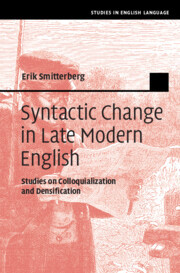Description
Syntactic Change in Late Modern English
Studies on Colloquialization and Densification
Studies in English Language Series
Author: Smitterberg Erik
Language: English
Approximative price 109.06 €
In Print (Delivery period: 14 days).
Add to cart
Publication date: 11-2021
300 p. · 16.5x23.6 cm · Hardback
300 p. · 16.5x23.6 cm · Hardback
Description
/li>Contents
/li>Biography
/li>
Syntactic Change in Late Modern English presents a stability paradox to linguists; despite the many social changes that took place between 1700 and 1900, the language appeared to be structurally stable during this period. This book resolves this paradox by presenting a new, idiolect-centred perspective on language change, and shows how this framework is applicable to change in any language. It then demonstrates how an idiolect-centred framework can be reconciled with corpus-linguistic methodology through four original case studies. These concern colloquialization (the process by which oral features spread to writing) and densification (the process by which meaning is condensed into shorter linguistic units), two types of change that characterize Modern English. The case studies also shed light on the role of genre and gender in language change and contribute to the discussion of how to operationalize frequency in corpus linguistics. This study will be essential reading for researchers in historical linguistics, corpus linguistics and sociolinguistics.
1. Introduction; 2. Socio-Cultural and Linguistic Change in Late Modern English; 3. Aspects of Language Change; 4. Methodological Framework; 5. Colloquialization I: Not-Contraction; 6. Colloquialization II: Co-Ordination by and; 7. Densification I: Nouns as Premodifiers in Noun Phrases; 8. Densification II: Participle Clauses as Postmodifiers in Noun Phrases; 9. Concluding Discussion; Appendix; References; Index.
Erik Smitterberg is Senior Lecturer in English Linguistics in the Department of English at Uppsala University. Recent publications include Late Modern English (co-edited, 2020).
© 2024 LAVOISIER S.A.S.




